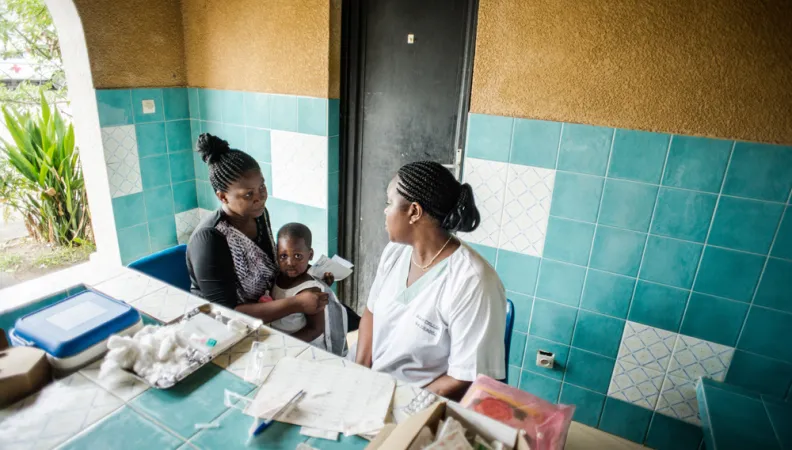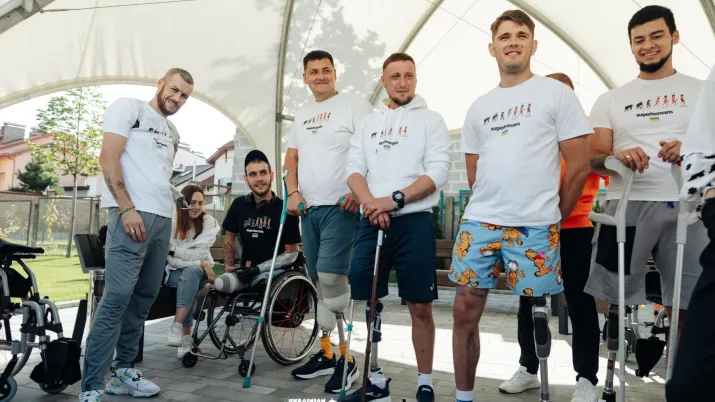Share the page
Taking greater account of maternal and newborn health
Published on

While France’s new Global Health Strategy 2023-2027 reiterates France’s commitment to universal health coverage (UHC) and the defence of human rights, and places emphasis on the “One Health” approach, by promoting the interlinkages between human, animal and ecosystem health, the focus of this year’s World Health Day is maternal, newborn and child health. An opportunity for Expertise France to recall its role in defending these fundamental rights.
Every day, approximately 800 women die from preventable causes related to pregnancy or childbirth, while 2.3 million newborns die within the first 28 days of birth every year, often due to a lack of access to essential care (WHO, 2023; UNICEF, 2024).
These indicators reflect health inequalities that remain deep-rooted, especially in low- and middle-income countries. Despite the progress achieved through the Sustainable Development Goals, the reduction of maternal and neonatal mortality remains unequal and fragile, faced with health systems that are not sufficiently resilient, the shortage of trained personnel, and chronic underfunding. Fully integrating these issues into global health strategies requires a systemic approach, focusing on strengthening primary care, universal health coverage, and taking account of the social determinants of health.
Strengthening maternal and newborn health by addressing vulnerabilities
In line with France’s priorities, the agency is continuing its efforts to help build robust and equitable health systems. This commitment results in the development and implementation of numerous projects to reinforce health human resources, improve healthcare services and access to health products, strengthen health system governance, and develop public health policies.
For example, in Chad, the PASST3 project aims to reduce gender inequalities and improve sexual and reproductive rights and health in N’Djamena, Logone Occidental, and Ouaddaï.
One of the components implemented by Expertise France involves providing technical assistance to strengthen health services for reproductive, maternal, newborn, child and adolescent health (RMNCAH), sexual and reproductive health rights (SRHR), and nutrition. The objective is to address the specific needs of women and adolescents and reduce gender inequalities. These rights are specifically promoted with the Ministry of Health, in close cooperation with the Ministry for Women and the Protection of Early Childhood, to ensure that the needs of young women and adolescents are given fairer and more permanent consideration in the implementation of public health policies.
Conflict zones also constitute an additional barrier to improving care conditions for mothers and their newborn children. In Syria, the HERNES 4 project, financed by the French Crisis and Support Centre (CDCS) with €5 million for a period of 24 months, aims to provide health services in hard-to-reach areas. It is also training health workers in more than 15 organisations in northeast Syria on the issue of maternal and child health. These trained professionals, mainly gynaecologists, obstetricians, midwives and nurses, will ultimately contribute to expanding the network of healthcare professionals in the country. This will improve care for vulnerable people.
This project, which is being implemented in partnership with the Franco-Syrian NGO Mehad, is also helping to restore essential services in the three governorates supported.
L’Initiative committed to addressing infectious diseases
In 2023, L’Initiative committed €16.9 million for 93 technical assistance missions, €38.2 million for 18 intervention and operational research projects, and €25.2 million for 15 interventions to address challenges that are neglected, in particular regarding health human resources.
These efforts are intended not only to build local capacity, but also to ensure that the most vulnerable population groups benefit from quality healthcare in fragile settings.
In terms of child health, pandemic diseases in particular affect children. L’Initiative is actively involved in addressing the major challenges of paediatric HIV/AIDS, tuberculosis and malaria, in a horizontal and specific manner.
In Cameroon, screening for drug-susceptible and drug-resistant tuberculosis among children under 15 years of age is insufficient. While WHO recommends that children under 15 years of age should account for 10 to 12% of reported cases, this rate only stood at 5.7% in 2023 and 6.7% in 2024. The TB_PEC@2.0 project to tackle paediatric tuberculosis aims to reduce TB mortality and morbidity, by focusing on active research for paediatric tuberculosis to improve child screening and TB preventive treatment.
Led by the organisation For Impacts in Social Health (FIS), the project aims to contribute to the national objectives for the eradication of tuberculosis by 2030. It is being deployed in 35 health facilities of the 8 health districts in the city of Yaoundé. The project is addressing critical needs to compensate for the lack of paediatric TB prevention, diagnostic and treatment. One of its objectives is to increase the proportion of paediatric TB notification to 10%, the treatment success rate to 90%, the coverage rate for TPT (TB preventive therapy) among children aged 0-5 years to 80%, and the TPT completion rate to 75%.
At the same time, health workers involved in the project, through contact tracing of index cases, are being trained in the crucial importance of early and systematic screening of paediatric tuberculosis and the issues it involves.
In Ghana, through L’Initiative, Expertise France is also involved in increasing investments in personnel, infrastructure and logistics to integrate these primary care services in remote areas.
The Basic Needs project is being deployed in 14 health districts in 7 regions of Ghana. The objective is to promote health equity and increase access to psychosocial and mental health support services for pregnant and post-partum women and adolescent girls, for those living with or at risk of HIV, and for survivors of gender-based violence.
It primarily targets people most exposed to the risk of HIV and tuberculosis. The innovative approach aims to integrate mental health support for girls and women, and increase access to these services in health centres and maternity clinics.
The value of this initiative lies in the consideration of the interaction between communicable diseases and mental health problems. It provides support geared to situations where these problems increase vulnerability and the risks of mother-to-child transmission.
On the same topic
Key Priorities to Address Antimicrobial Resistance in Dominican Republic
Published on November 20, 2025



